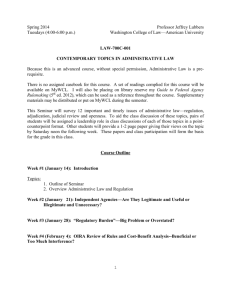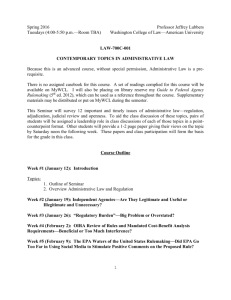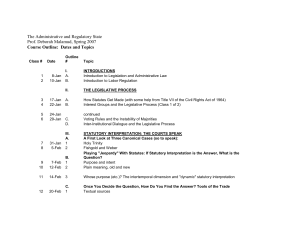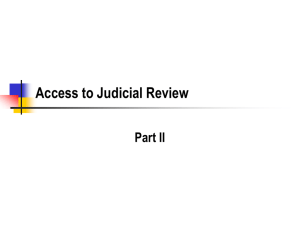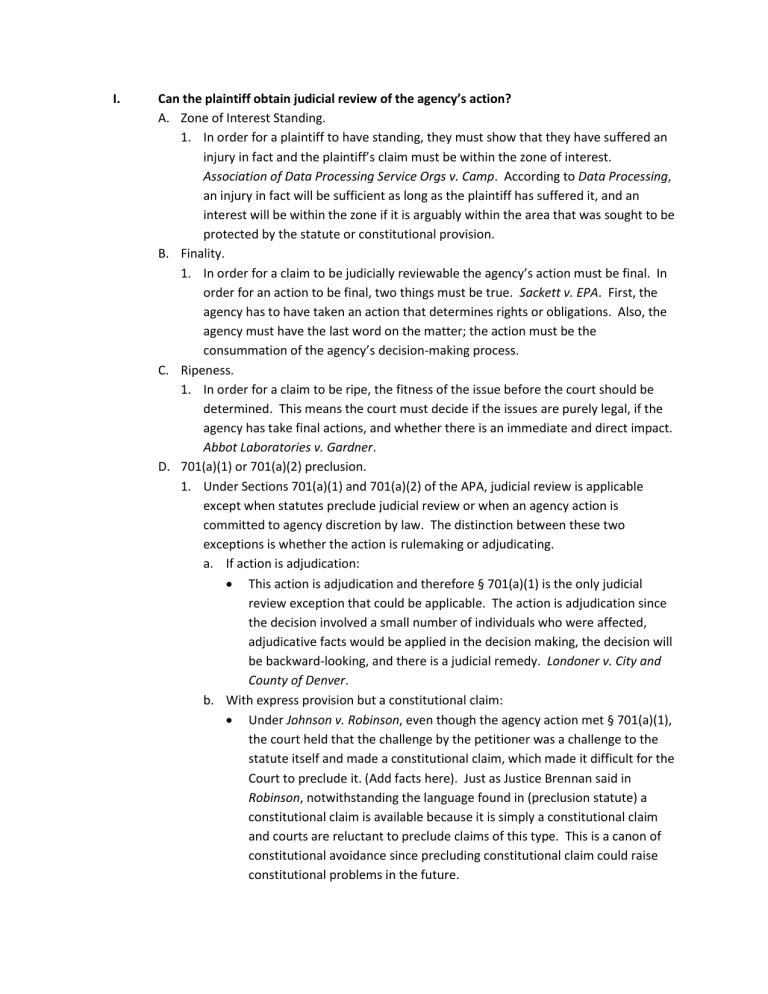
I. Can the plaintiff obtain judicial review of the agency’s action? A. Zone of Interest Standing. 1. In order for a plaintiff to have standing, they must show that they have suffered an injury in fact and the plaintiff’s claim must be within the zone of interest. Association of Data Processing Service Orgs v. Camp. According to Data Processing, an injury in fact will be sufficient as long as the plaintiff has suffered it, and an interest will be within the zone if it is arguably within the area that was sought to be protected by the statute or constitutional provision. B. Finality. 1. In order for a claim to be judicially reviewable the agency’s action must be final. In order for an action to be final, two things must be true. Sackett v. EPA. First, the agency has to have taken an action that determines rights or obligations. Also, the agency must have the last word on the matter; the action must be the consummation of the agency’s decision-making process. C. Ripeness. 1. In order for a claim to be ripe, the fitness of the issue before the court should be determined. This means the court must decide if the issues are purely legal, if the agency has take final actions, and whether there is an immediate and direct impact. Abbot Laboratories v. Gardner. D. 701(a)(1) or 701(a)(2) preclusion. 1. Under Sections 701(a)(1) and 701(a)(2) of the APA, judicial review is applicable except when statutes preclude judicial review or when an agency action is committed to agency discretion by law. The distinction between these two exceptions is whether the action is rulemaking or adjudicating. a. If action is adjudication: This action is adjudication and therefore § 701(a)(1) is the only judicial review exception that could be applicable. The action is adjudication since the decision involved a small number of individuals who were affected, adjudicative facts would be applied in the decision making, the decision will be backward-looking, and there is a judicial remedy. Londoner v. City and County of Denver. b. With express provision but a constitutional claim: Under Johnson v. Robinson, even though the agency action met § 701(a)(1), the court held that the challenge by the petitioner was a challenge to the statute itself and made a constitutional claim, which made it difficult for the Court to preclude it. (Add facts here). Just as Justice Brennan said in Robinson, notwithstanding the language found in (preclusion statute) a constitutional claim is available because it is simply a constitutional claim and courts are reluctant to preclude claims of this type. This is a canon of constitutional avoidance since precluding constitutional claim could raise constitutional problems in the future. E. Statutory Standing. 1. Under § 702 of the APA a person suffering a legal wrong because of an agency action, or adversely affected by agency action within the meaning of a relevant statute, is entitled to judicial review. II. Can plaintiff raise a structural constitutional challenge? A. Non-delegation problem. 1. The Non-Delegation Doctrine prohibits Congress from delegating excessive legislative discretion to the executive branch. However the Court stated in J.W. Hampton, Jr. & Co. v. U.S. that delegation is permissible when Congress “lay[s] down by legislative act an intelligible principle to which the person or body authorized to fix such rates is directed to conform.” This “intelligible principle” remains the standard for determining whether Congress has delegated too much legislative discretion. B. Article III challenge. 1. Even though agency adjudication appears to violate Article III, federal courts have approved agency adjudication when it occurs under circumstances thought not to threaten the policies and values underlying Article III. This means that agency adjudication is permissible in public rights disputes, such as disagreements over things like licenses. Also, agency adjudication can occur between two private parties where the rights in dispute are closely associated with the federal regulatory scheme, or where the essential attributes of judicial power remain in the federal courts so not to threaten the role of those federal courts. As seen in CFTC v. Schor, the Court also appears to value that the parties have a choice between an Article III court and a non-Article III tribunal. III. Can plaintiff challenge the agency’s action in “administrative common law” grounds? A. Accardi. 1. Under the Accardi Doctrine, agencies are required to follow their own rules unless and until those rules are duly appealed or amended. IV. Can plaintiff challenge the agency’s action on procedural grounds? A. Section 553 informal rulemaking exception. 1. There is a strong argument to be made by the government that the Guidance Doctrine falls within the APA’s exception under § 553. To show that the Guidance Doctrine is not subject to notice and comment the government will likely argue that it did not meet the criteria given in American Mining. Under American Mining four factors were considered to determine if the interpretive rule present had a legal effect. Those factors are: whether in the absence of the rule there would be an adequate legislative basis for enforcement action or other agency action to confer benefits or ensure the performance of duties; whether the agency published the statement in the CFR; whether the agency has explicitly invoked its general legislative authority, or; whether the rule effectively amends a prior legislative rule. B. Rulemaking vs. adjudication. 1. Under the decision of SEC v. Chenery Corp., otherwise known as Chenery II, the court ruled that agencies could choose between rulemaking and adjudication. Specifically the court stated that the choice between an agency proceeding by general rule or by individual, ad hoc litigation is one that lies primarily in the informed discretion of the administrative agency. There are some exceptions to this rule though, including that it is unlawful for an agency to choose adjudication if there were no enabling statute or adjudication constituted an abuse of power. An abuse of power could mean detrimental reliance, severe harm, and instances of the like. C. Substantial evidence test of formal adjudication/rulemaking. 1. Under the substantial evidence test, the court must look if an agency’s conclusion was based on substantial evidence on the record as a whole and whether the record would allow a reasonable jury to reach the same decision. Universal Camera Corp. v. NLRB. V. Can plaintiff challenge the agency’s action on substantive grounds? A. Can plaintiff challenge the agency’s exercise of policy discretion or the thoroughness of its reasoning (i.e., hard look review)? 1. Hard look claim. a. Viking may bring a claim under the Hard Look approach to show that the agency’s decision was arbitrary and capricious, so therefore a hearing is necessary. This approach is a narrow one and is “searching and careful.” Overton Park. b. (Plaintiff name) could challenge the agency’s thoroughness of reasoning under a hard look review. This review is an approach to the arbitrary and capricious standard with two dueling approaches. The Court could follow a Leventhal approach, which is a substantive approach, or a Bazelon reasoning which follows a procedural argument to determine if the agency gave a thoroughenough of a reason to explain the choice it made. 2. Arbitrary and capricious standard. a. The arbitrary standard is “searching and careful” and this standard of review is narrow and does not empower the court to substitute its judgment for that of the agency. Overton Park. Under this standard, the court requires that an agency to explain its decisions on major issues raised during the decisionmaking process. Also, an agency must not consider factors not identified in the agency’s governing statute.
